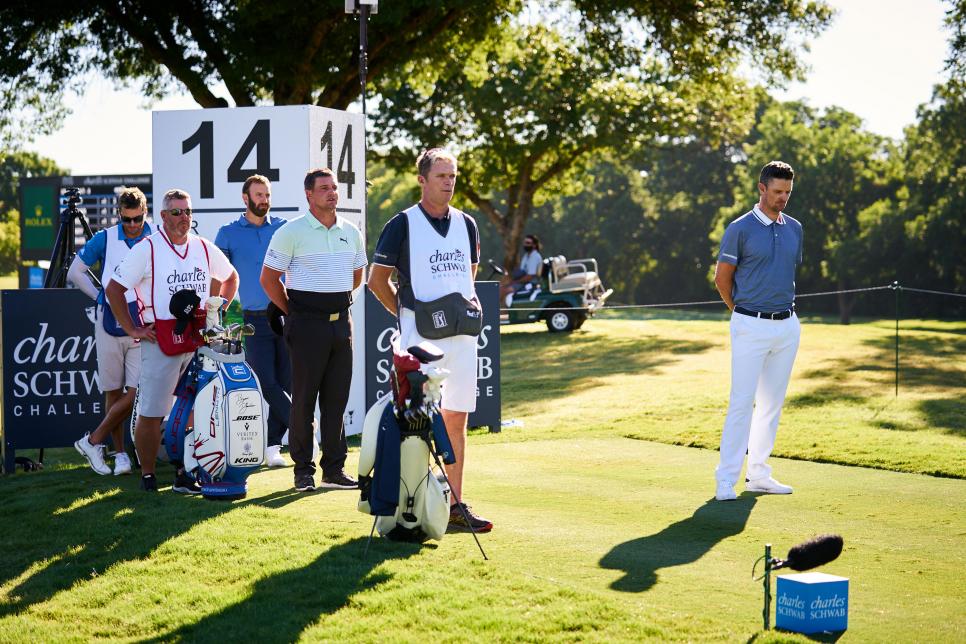News
At an already quiet Colonial, a minute of silence takes on a deeper meaning

Dustin Johnson, Bryson DeChambeau and Justin Rose stand with their caddies during a moment of silence at Colonial Country Club on Thursday.
Darren Carroll for Golf Digest
FORT WORTH – It was quiet enough at Colonial when the air horn pealed three times. Then, silence.
No one moved. No one spoke. The 65 players already on the course removed their hats and stood, a still frame that coincided with an 8:46 a.m. starting time at the Charles Schwab Challenge left open by the PGA Tour. On the first and 10th tees, the only sound was the rasp of a generator and the song of birds.
The tour announced Monday that the time—8:46, the length of time it took George Floyd to die under the weight of a Minneapolis police officer—would represent its effort to acknowledge and confront injustices suffered by African-Americans. The moment lasted long enough at Colonial to give everyone space to think. The absence of spectators and the empty golf course seemed the give the pause even more weight.
Earlier in the week, a handful of the 148-player field were asked about the gesture. Everyone agreed it was a good idea, necessary and responsible. Some players had more to say. They saw more than symbolism. They saw an opportunity for everyone who plays the tour, everyone who plays golf, to try harder and do more.
Brooks Koepka said, “I think it’s important to set the tone.”
Jon Rahm said, “I understand you can’t make everybody aware of everything, but if I can just have one more person understand the situation and support it, to me it’s a win.”
Defending champion Kevin Na said, “Every player can have an impact to their fans or followers.”
Here’s what Harold Varner III said: “I think there will be discussion. I think some will forget about it.”
Varner is one of few black players on any of the professional golf tours. He is a 29 and has a voice. He posted to his social-media account a plea for unity after Floyd’s death and the protests against police brutality that followed. He and PGA Tour commissioner Jay Monahan taped a conversation last Friday about race in golf. It went, as they say, viral. In it, Varner asked Monahan about diversity in the game.
“Oh, I think we’ve been trying really, really hard,” the commissioner said.
“That’s where I struggle,” Varner said. “I think it’s just really hard. Because if it was so easy, why wouldn’t we do it?”
An open 8:46 tee time won’t change the world. Three blasts from an air horn won’t unite the country, and a moment of silence won’t heal the city of Fort Worth, where a few hundred peaceful protesters gathered Tuesday night near the zoo and a few dozen marched Wednesday evening with a police escort through the streets of downtown. But the consensus at Colonial is that doing nothing was not an option.
“I think the fact that the tour has chosen to show some solidarity, and highlight the racial injustice that the black community is facing, is a good thing,” Dylan Frittelli said. “It needs to be done.” Then the South African added: “I think there’s more that can be done than just reserving a tee time.”
Still, you never know what might rise from an open tee time at a golf tournament. Hope, at least.
As Varner wrote after the death of George Floyd: “Life is more nuanced than a simple statement.”